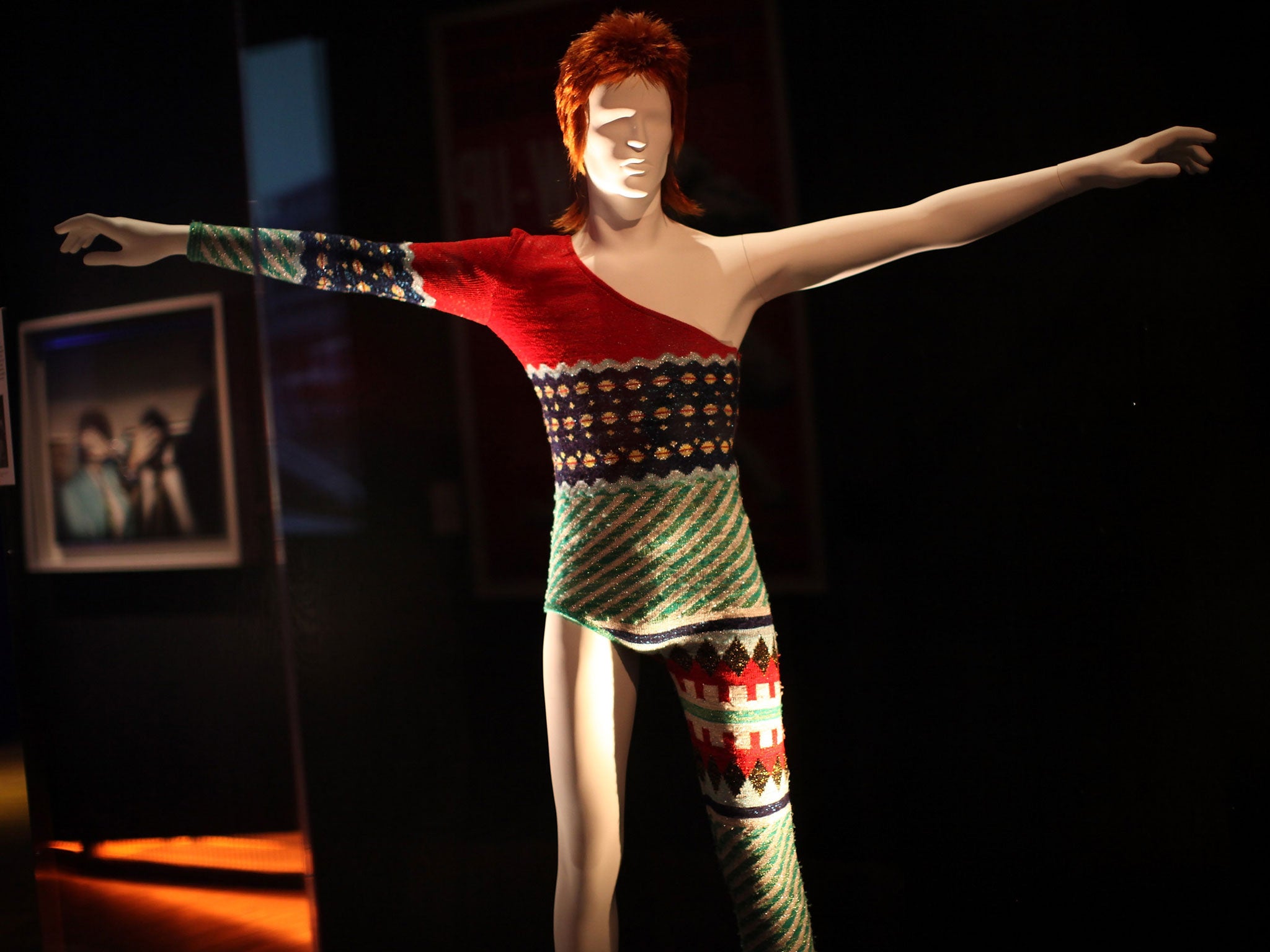I don’t get David Bowie. Maybe because I'm female
Bowie appeals to suburban boys with spots, not much pubic hair and a fear of girls

A little group of us have slunk out of the shadows on Twitter. We do not really get David Bowie. We do not hate Bowie; we are not haterz; we don’t want to goad or troll his Belieber-like devotees. We just don’t really care. We are unmoved by him. The opening this week of an exhibition dedicated to him at the Victoria and Albert Museum testifies to Bowie’s iconic status as the hologram of pop music, defining style over substance. But without much embarrassment, and with not that much anxiety about being considered a barbarian, I say that Bowie leaves me cold.
When, on the opening night of the Olympics, and the closing night, and the opening of the Paralympics, and the closing night of those, everyone was tweeting where’s Bowie; it was obvious that “Heroes” was the unofficial theme song for the occasion. Everyone wanted him to turn up, the reclusive thin white duke, holed up in his New York mansion, the frail but ossified living legend. Then the groans when we got Paul McCartney playing “Hey Jude”, the official anthem of the concert arranger who doesn’t know how to finish. I wanted Bradley Wiggins to duet with Pete Townshend on “My Generation”.
My record-buying commenced on 22 March 1963, aged 12, with the purchase of the Beatles’ debut LP Please Please Me on the day of release, at Brian Epstein’s record shop in Liverpool. I woke up into puberty to the sound of the Beatles, Stones, Dylan, Kinks, the Who and Motown. Bowie released “Space Oddity” in July 1969 when it was somewhat overshadowed by the Stones’ “Honky Tonk Woman”, Marvin Gaye’s “Heard it Through the Grapevine” and Fleetwood Mac’s “Albatross”. Bowie really started to emerge in his Ziggy Stardust persona when I was at university in the early 1970s.
The early, pure sounds of the R&B-influenced 1960s had bloated into acid and prog rock and heavy metal, fatter and fatter until they burst. Glam rock for me was a risible symptom of Sixties musical exhaustion, when pop really had run out of anything to say any more and had to rely almost solely on stage make-up. It was one of the cheesiest, most vulgar and commercially cynical genres. There was nothing earnest about it, not like Soft Machine fans who were chord and rock family tree bores. Glam rock was a bit of a laugh. Mums and dads quite liked it in the way that reminded them slightly of music hall and Sunday Night at the London Palladium.
Bowie was a glam rocker. He did it a little differently from Alvin Stardust, partly because he was younger and a lot thinner and in his hands it managed to avoid some of the ridiculous excesses of, say, Kiss. He had a huge impact on cosmetics. At my birthday party in February 1974, I wore a backless halter-neck dress with a Bowie lightning flash in blue glitter all down my back. The early 1970s were, for the questing urban radicals tapping their heels impatiently waiting for punk, the age of androgyny for which Bowie was partly responsible, along with Mick Jagger and James Fox in the extraordinary gender-bending cult film Performance.
Last week, an old friend posted on Facebook a picture of himself and his friend, the actor Bill Nighy, leaving the Bowie exhibition, sharp dressers giving Ziggy Stardust himself a run for his money. And then the penny dropped for me. It’s a boy thing. Bowie appeals to suburban 14-year-old boys with spots, not much pubic hair and a fear of girls. Boys in school uniforms. Boys in weekend trousers bought by their mums for them at Marks & Spencer. Boys hanging round the coach station watching the names of the destinations on the departing buses.
For young men dithering over their sexuality at a time when homosexuality had been legal for less than a decade, the sight of someone playing around so ambiguously with gender must have been electrifying. In the early 1970s, a friend saw Bowie perform at Newcastle Town Hall. He knelt down and sang “Let’s Spend the Night Together” to a 15-year-old boy at the front of the stage. For the audience, the moment was mind blowing. Grown men went home and allowed their eyelids to be lined with kohl by their girlfriends. There’s no doubt that Bowie helped boys to come out as gay, just as he helped other boys to arrive at a less macho heterosexual identity. Bowie offered choices; he was a definitive Other. His strangeness was the point.
But for teenage girls, Bowie was as threatening in his masculinity as Donny Osmond and David Essex, or Justin Bieber today; he was the safe choice of poster for 13-year-olds to Blu-Tack to their bedroom walls. For me, he was all spectacle, costume and persona which always carries with it a very slight hint of fascism. Bowie’s reported one-time fascination with the Third Reich did not come as a total surprise.
After the initial shock, the posing came to seem just an empty case, a vehicle for Bowie’s increasingly weary costume changes. He made Boy George possible and Boy George made Madonna possible, the hollow era of disco. I liked Bowie’s music, with its art school poetry, but not enough to love it. And let us never forget: Bowie, along with Rod Stewart, gave the world the mullet.
Linda Grant is an Orange Prize winner whose most recent novel is ‘We Had It So Good’

Join our commenting forum
Join thought-provoking conversations, follow other Independent readers and see their replies